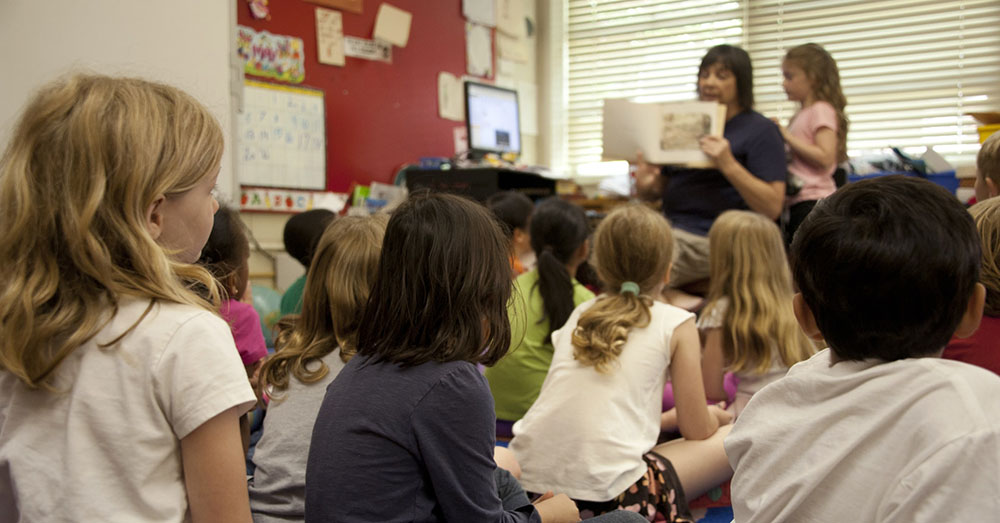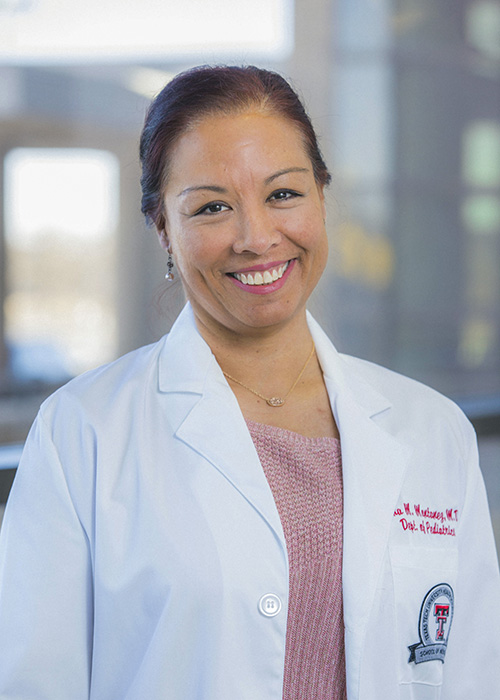Planning Ahead Can Make the First Day of School Less Stressful
TTP Pediatrician Offers Tips to Help Children Transition Back to the Classroom

As summer winds down and the beginning of a new school year approaches, many children look forward to purchasing new clothes and school supplies, reuniting with friends and meeting new teachers. Ana Montanez, M.D., a pediatrician with Texas Tech Physicians, said there are steps parents can take to help their children—and themselves—transition from the swimming pool to the classroom as smoothly as possible.
Develop a Routine

Ana Montanez, M.D.
A week before school starts, Montanez suggested establishing a routine that includes going to bed earlier, getting up when the alarm goes off and practicing good sleep hygiene. That includes avoiding caffeinated drinks before bed, making the room quiet, dark and cool, turning off all electronic device screens and charging cell phones outside the bedroom.
If the morning routine involves a walk to the school bus stop, or if the child will be riding a bike or driving from home to high school, Montanez suggested making some practice runs prior to the first day of school so the child is assured of arriving on time.
Montanez said establishing a routine also is important for parents who may have altered their sleeping patterns in the summer to take advantage of their children sleeping longer.
“If our kids are sleeping in, we can sleep a little bit longer too, so getting our bodies reset at least a week before school starts will also help us with our morning routine so that we're not running around trying to get things organized the first morning of school,” Montanez said.
Make a Checklist
The things children may need to have a successful school year changes as they move from one grade or one school to the next. Montanez said making a checklist a week or two before school starts is an effective way to ensure children have what they need when that first day of classes arrives.
“You want to make sure you have everything that you need for school, so making a checklist if you're going to pack lunches, if you need to get some school supplies, if you need to get new socks or clothing or you need to have an eye exam to get new glasses, those are things that you want to (include on) a checklist,” Montanez said.
Visit the School
If the school allows, Montanez suggested making an appointment with the school to take a tour before the school year starts. This can be especially important if the child is attending a new school or transitioning from an elementary to junior high or junior high to high school. Letting a child see where their classes are and maybe meeting their teacher can minimize any anxiety or doubts the child may be feeling.
“The first day of school, teachers are going to be pretty busy and there’s going to be limited time you're going to have to ask questions, so if you can do that ahead of time, that will help you get back into that mindset of, ‘Okay, this is this is what a school day is going to look like.’ ”
Communicate and Support
No matter how much planning and practicing goes into preparing a child for the new school year, there will likely be hurdles that pop up unexpectedly. Montanez said the key to preparing for dealing with those situations is consistent communication and encouragement, whether it’s a hug, a compliment or a just a kind word. She also suggested purchasing for your child one of the Back to School or First Day of School bracelets being touted on social media. If they start feeling overwhelmed, they can touch the bracelet and be reminded that they have your encouragement, support and love.
“As parents, giving them something tangible that they can actually hold reminds them that even though it's becoming an overwhelming day, they are not alone,” Montanez said. “I think the one thing that I would recommend parents give their children before they leave for school is just a reminder of your support.”
Update Vaccinations
Most children receive the majority of their vaccines before they are two years old, and then receive booster shots at four years old before they start kindergarten. Before starting junior high, Montanez said children typically need another set of boosters and their meningitis shots. Additional boosters, including those for meningitis, also may be necessary when students start high school and college. Montanez said getting an annual flu shot also is important to protect the child and those around them.
“That's a preventable disease, and vaccines can prevent the seriousness of the (flu) disease from happening,” Montanez emphasized. “I'm a parent myself, so I often share with my families that the last thing you want as a mother is to sit in a hospital room with her child hooked up to oxygen and IVs and think, ‘I could have protected them against this.’ Vaccines, especially for things like the flu, are very important to give our children to protect them.”
Well-Child Visits
To ensure your child starts the school year as healthy as possible, Montanez recommends a well-child visit with a pediatrician. Optimally, the visit should be scheduled about four to six weeks before school starts to leave enough time for any additional testing, diagnostic workups or referrals that may be necessary before the year gets underway. However, if scheduling a visit that far in advance is not possible, try to set up an appointment prior to the first day of school or as soon as possible after school starts.
Based on the child’s developmental age, Montanez said the pediatrician will check vital signs such as the heart and respiratory rates. High school children may have their blood pressure checked. The visit typically concludes with a question-and-answer session between the physician, the patient and the parent or guardian.
Pediatricians also review the child’s medication list for those who have chronic illnesses or diseases such as asthma or a seizure disorder, or behavioral disorders like anxiety or ADHD (attention-deficit/hyperactivity disorder).
Medication dosing in children is primarily determined by height and weight. Because these factors frequently change in children as they grow, adjustments may be necessary. However, whether or not medication changes are made from one school year to the next, Montanez said parents should provide schools with updated guidance about what actions to take if the child has an issue while in class.
“Reviewing those before school often helps us to devise an action plan, such as an asthma plan or a seizure treatment plan, that can help both the school and the child,” she added.
Related Stories
The John Wayne Cancer Foundation Surgical Oncology Fellowship Program at Texas Tech University Health Sciences Center Announced
TTUHSC is collaborating with the John Wayne Cancer Foundation and has established the Big Cure Endowment, which supports the university’s efforts to reduce cancer incidence and increase survivability of people in rural and underserved areas.
Making Mental Health a Priority in the New Year
Sarah Mallard Wakefield, M.D., a psychiatrist with Texas Tech Physicians, talks about strategies to combat widespread and growing anxiety.
TTUHSC Dean to be Inducted into the National Academies of Practice as Distinguished Fellow
Gerard E. Carrino, Ph.D., MPH, dean of the TTUHSC Julia Jones Matthews School of Population and Public Health, will be inducted into the National Academies of Practice (NAP) as a Distinguished Fellow of the Public Health Academy.
Recent Stories
National Academy of Inventors Names TTUHSC Faculty Senior Members
The National Academy of Inventors (NAI) has designated two current and one former TTUHSC faculty researchers as Senior Members.
The John Wayne Cancer Foundation Surgical Oncology Fellowship Program at Texas Tech University Health Sciences Center Announced
TTUHSC is collaborating with the John Wayne Cancer Foundation and has established the Big Cure Endowment, which supports the university’s efforts to reduce cancer incidence and increase survivability of people in rural and underserved areas.
TTUHSC Receives $1 Million Gift from Amarillo National Bank to Expand and Enhance Pediatric Care in the Panhandle
TTUHSC School of Medicine leaders accepted a $1 million philanthropic gift from Amarillo National Bank on Tuesday (Feb. 10), marking a transformational investment in pediatric care for the Texas Panhandle.
